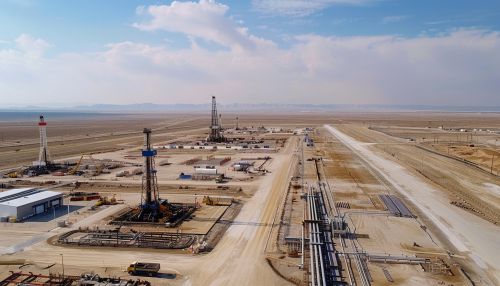Economy of the Middle East
Overview
The Economy of the Middle East is diverse and complex, with a wide range of industries contributing to the overall economic output. The region is known for its vast reserves of oil and gas, which have played a significant role in shaping the economic landscape. However, the Middle East's economy extends beyond the energy sector, with significant contributions from agriculture, manufacturing, services, and more recently, technology and innovation.


Oil and Gas Industry
The Middle East is home to some of the world's largest oil reserves, making the oil and gas industry a significant part of the region's economy. Countries like Saudi Arabia, Iran, and United Arab Emirates are among the top oil producers globally. The revenue generated from the oil and gas industry has been instrumental in the economic development of these countries, funding infrastructure projects, social services, and other government expenditures.
Agriculture
Despite the arid climate and challenging environmental conditions, agriculture plays a crucial role in the Middle East's economy. Countries like Egypt, Turkey, and Iran have significant agricultural sectors, producing a wide range of crops, including wheat, cotton, fruits and vegetables, and livestock. The region's agricultural sector also contributes to food security, rural development, and employment.
Manufacturing
The manufacturing sector in the Middle East has been growing steadily, with countries like Turkey, Saudi Arabia, and United Arab Emirates leading the way. The sector includes a wide range of industries, including petrochemicals, automobiles, textiles, and food processing. The growth of the manufacturing sector has been driven by factors such as government support, availability of raw materials, and increasing domestic and international demand.
Services
The services sector is a significant part of the Middle East's economy, encompassing industries such as tourism, banking and finance, real estate, and retail. Countries like Dubai in the United Arab Emirates and Qatar have become global hubs for tourism and finance, attracting visitors and investors from around the world. The growth of the services sector has been driven by factors such as government policies, infrastructure development, and increasing domestic and international demand.
Technology and Innovation
In recent years, the Middle East has been making strides in the field of technology and innovation. Countries like Israel, United Arab Emirates, and Saudi Arabia are investing heavily in research and development, startups, and technology parks, aiming to diversify their economies and reduce dependence on oil. The growth of the technology sector has been driven by factors such as government support, availability of capital, and a young and tech-savvy population.
Challenges and Opportunities
The Middle East's economy faces several challenges, including political instability, environmental issues, and economic diversification. However, the region also presents numerous opportunities, such as the potential for renewable energy, the growth of the digital economy, and the untapped potential of its young and dynamic population.
